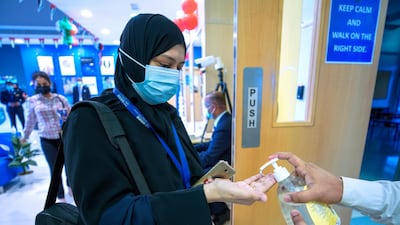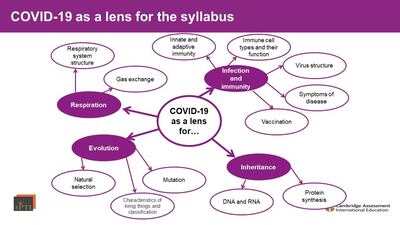Education experts have teamed up to make Covid-19 more applicable to the classroom by incorporating the pandemic in students’ learning about their core subjects.
Cambridge Assessment International Education and the UK education charity PTI have developed a series of webinars aimed at teachers that advise on how to utilise the virus through real world examples as a way to make their subjects more relatable.
The six lectures, mainly delivered by university experts, focus on Business and Economics, English Language, Geography, Mathematics, Psychology and Science
"Sometimes in classes students struggle to engage because they don't feel that their learning is applicable to the wider world," Paul Ellis, the head of teaching and learning at Cambridge International, told The National.
He noted that last year when the virus had taken hold there were all sorts of scientific terms being used in the media that many had maybe not heard of or understood.
So it was perhaps natural that science would be the subject the first webinar focused on, with Mr Ellis recruiting Dr Karen Angus-Cole, a lecturer in science education at the University of Bath, and Dr Jeremy Rowe, a biology teacher, to help.
In her lecture, Dr Angus-Cole displays a mind-map of words that have now become part of everyday language. Phrases such as ‘respiratory system structure’, ‘gas exchange’, ‘vaccination’ and ‘mutation’ have a very real, current relevance.
The Business and Economics lecture is able to use the abundance of examples that have come out of the last year as the global economy has collapsed and new ways of working have emerged.
It has been widely documented the additional struggles students and teachers alike have faced as classrooms have shuttered up. Mr Ellis pointed out it can be difficult for many young people to stay focused in school as it is, let alone when they are stuck at home and feeling isolated.
As teaching has shifted online, educators have had to rapidly develop ideas to keep schoolchildren engaged and ensure they are not left behind.
“When the pandemic began last year, we were looking for ways to support schools. We thought, well, there are many avenues we need to explore,” Mr Ellis said.
“We all know just how distracting the whole situation is so we wanted to explore how students can remain engaged in learning at this particular time,” he added.
“We began looking around and thinking, how we can, in a sense, provide a bit of a hook for students … motivate them to do things.”
“We thought, an obvious way of doing is to look at the applicability of learning. Applicability and relevance were a really big thing for us”.
The webinars are available to anybody anywhere in the world, in both secondary and higher education. Cambridge International has a strong presence in the UAE and Middle East and is a provider of A Levels and GCSEs to schools in the region. Mr Ellis said webinars generally have in a sense “come into their own” during the pandemic and he believes they have a role to play in the future.
Normally Cambridge International gives teaching training courses in person, but Mr Ellis said there has been a surge in the number of people attending sessions since they began offering many more online.
The pandemic has shown how much is possible online but technology still needs to do a lot of catching up so these possibilities can be realised, he said.
In terms of content, in the future he believes there could be an opportunity for learning to be made more applicable and engaged with current affairs.
A great deal of research by experts goes into developing syllabuses to make them relevant, but Mr Ellis said that doesn’t necessarily mean the right conversation can’t be had.
“There might be opportunities to have a think about what we do want to educate students about in the future. Is what we're doing in education the right kind of thing, is it relevant enough? Are we still teaching the same things that we did years ago?”












